BEIRUT: Family, friends and colleagues bade a tearful farewell on Aug. 15 to Ralph Mallahi, the sixth identified firefighter out of the 10 who perished in the explosion that destroyed or damaged nearly half of Beirut and led to the Lebanese government’s resignation.
Mallahi’s remains, encased in a white coffin, were carried by his colleagues — firefighters, officers and rescuers — all dressed in white, while his grieving family and relatives walked behind.
Wedding music played in the background as the funeral procession passed his workplace at the Beirut Fire Brigade headquarters in Karantina before touring the areas of Ain Al-Remmaneh and Forn El-Chebbak where Mallahi grew up. Rice and flowers were scattered, adding to the poignant scenes.
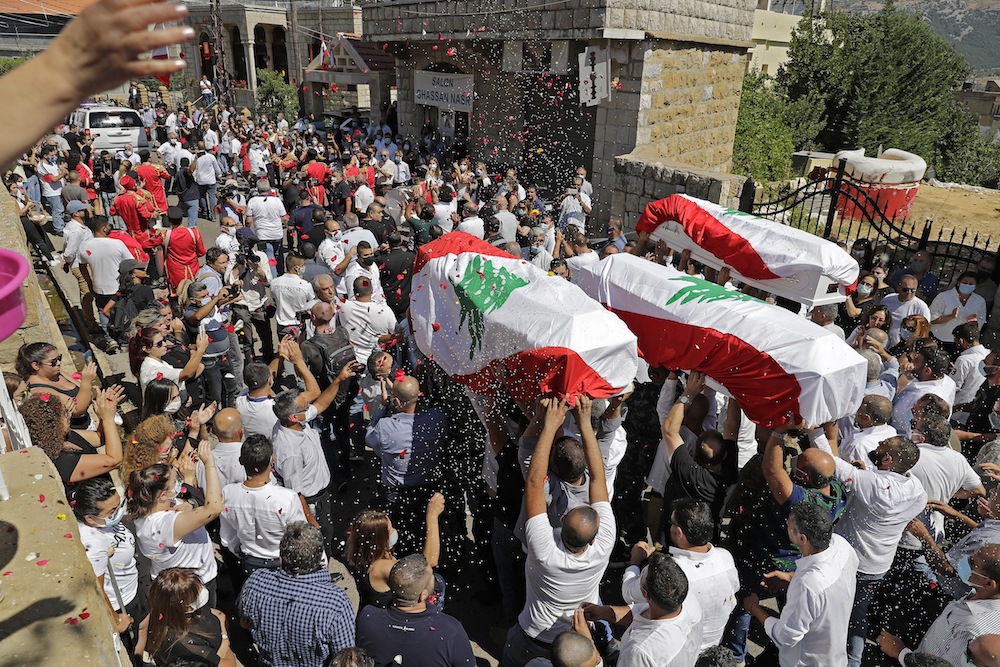
Relatives carry the coffins of firefighters Charbel Hitti, Najib Hitti and Charbel Karam during their funeral procession in their hometown of Qartaba, north of the Lebanese capital Beirut. (AFP)
A dashing, tall and blue-eyed 24-year-old, Mallahi was among a group of firefighters who died while trying to contain the fire in warehouse No. 12 at the Port of Beirut, before two explosions destroyed the waterfront and its neighborhoods on Aug. 4.
Neither the firefighters nor the rescuers knew that the warehouse contained 2,750 tons of ammonium nitrate, stored next to fireworks.
The explosion claimed the lives of 180 civilians, while 30 people are still missing. More than 6,000 people were injured, and thousands more were displaced in the tragedy that caused huge losses to private and public property, infrastructure, hospitals, educational establishments, churches and mosques.
The body of Staff Sergeant Charbel Karam was found on Saturday, days after the remains of Mallahi, Staff Sergeant Rami Kaaki, Sergeant Elie Khouzami, firefighter Joe Noon and rescuer Sahar Fares were discovered. Other bodies are yet to be identified.
The remains of firefighters Charbel Hitti, 22, his cousin Najib Hitti, Michel Hawwa and Joe Bou Saab have also been found.
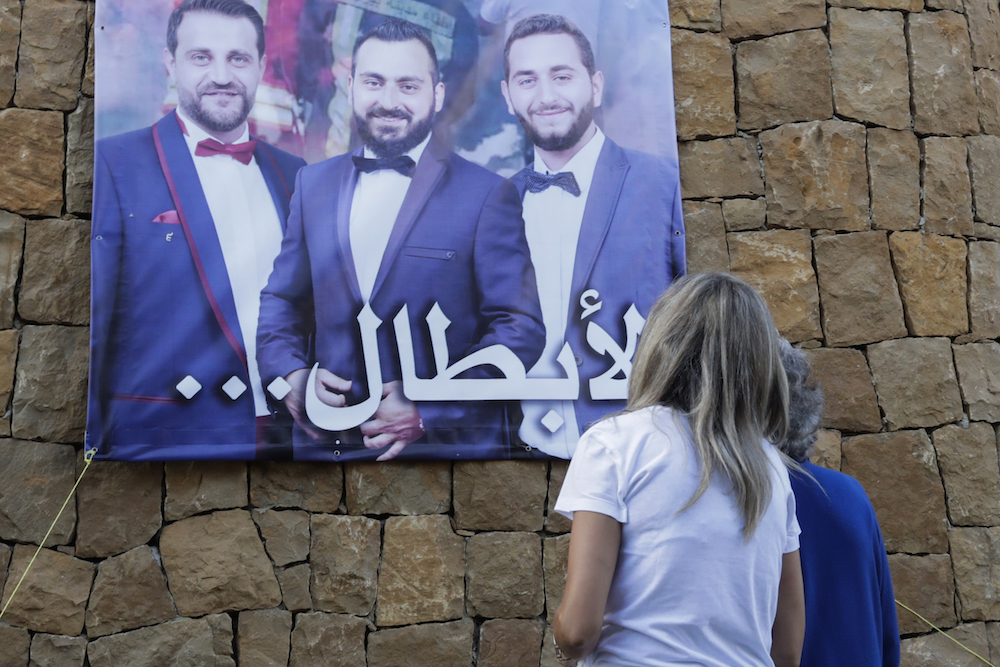
Lebanese women look at a poster bearing the portraits of three missing related firefighters who left together in one firetruck to douse a port blaze believed to have sparked the August 4 massive blast in Beirut and never returned home, with text below reading in Arabic "The Heroes." (AFP)
“Rescuers told us they pulled out remains and did a DNA test,” Charbel’s father George told Arab News.
Najib’s driving license was found next to human remains, indicating that he drove the fire truck.
On Monday, at a funeral for the three young men in their town, neighbors bid them a tearful last farewell.
An outwardly resilient George described the impact of the tragedy on his family: “My son wasn’t the only one killed in the crime committed against the Lebanese. Najib, 25, was working with him.”
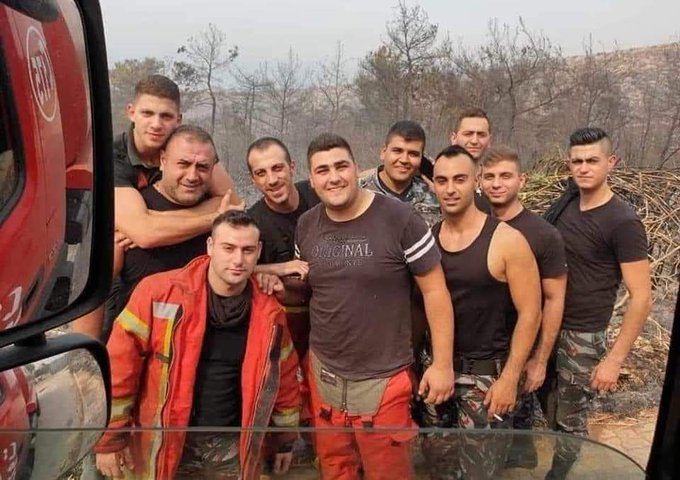
They both joined the fire brigade three years ago, having previously served in the Civil Defense brigade in Qartaba. “My cousin Charbel Karam, who is also my brother-in-law, was also killed with them,” said George.
As the villagers raised the pictures of their three lost sons with the caption “Heroes,” the grieving mother said: “I don’t know who to cry for, whether for my son Charbel Hitti, my brother Charbel Karam or my brother-in-law’s son Najib.”
George said the three young men served the people and helped the needy. They worked in Beirut and returned to their homes in Qartaba 55 km away, he said, adding: “Thank God they never joined any (political) party.”
On the day of the explosion, George was in Beirut and wanted to visit them at their workplace for the first time.
“I went to the headquarters where they were sleeping after a long night shift. I woke up my son Charbel and his cousin Najib, and told them I’d see them in Qartaba after their shift. ‘Go back to sleep’,” he said.
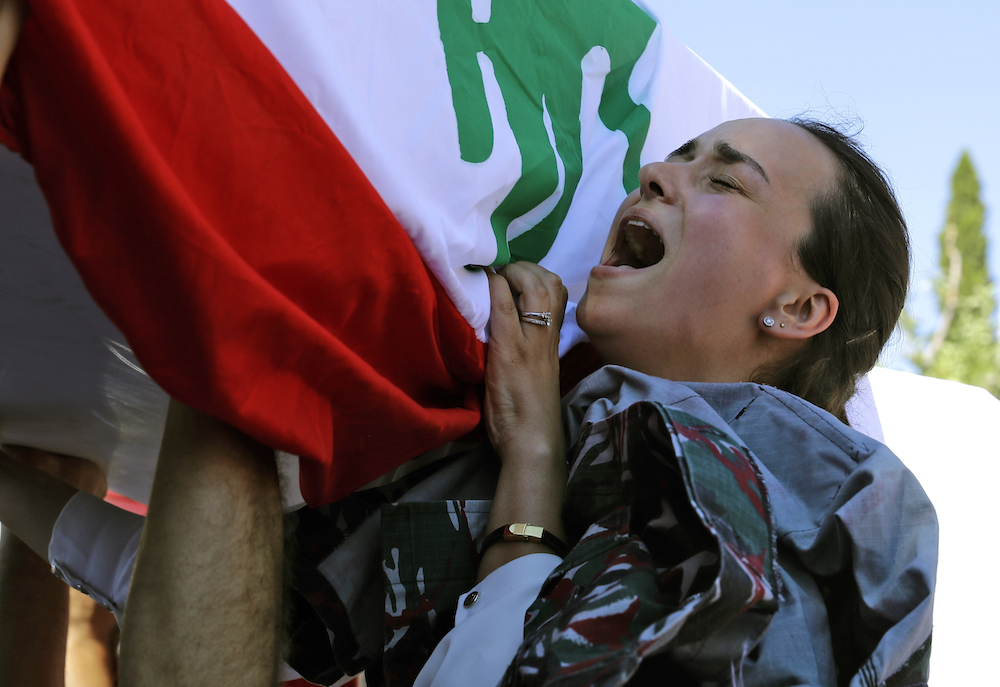
Karlen cries during the funeral procession of her husband Charbel Karam, brother Najib Hitti, and cousin Charbel Hitti in their hometown of Qartaba, north of the Lebanese capital Beirut, on August 17, 2020. (AFP)
George stayed in Beirut a little longer then returned home. “It didn’t occur to me that it would be the last time I’d see them — a farewell call,” he said. Karam, 37, leaves behind a wife and two baby daughters.
Beirut Mayor Marwan Abboud was the first to mourn the 10 firefighters on TV as he headed to the port, saying: “We lost 10 young people.”
The victims had headed from the Beirut Fire Brigade headquarters in Karantina to the port aboard a fire truck and an ambulance.
The body of young rescuer Fares was the first to be found in the explosion site. She was identified through her nails and pants.
The fire brigade to which the victims belonged carries the slogan “Chivalry — Sacrifice — Loyalty.”

It includes an organized and militarily trained technical group consisting of technicians specialized in firefighting, rescue and relief, in addition to military personnel to supervise abiding by order and command.
Colleagues who were with the victims when the fire alarm went off on the afternoon of Aug. 4 said Mallahi was the first to get on the fire truck bound for the warehouse.
Fares was the most enthusiastic and took pictures of the group smiling before sending it to the man she was to marry in June 2021.
Her body was found under the rubble the day after the explosion, and the group’s picture went viral on social media.
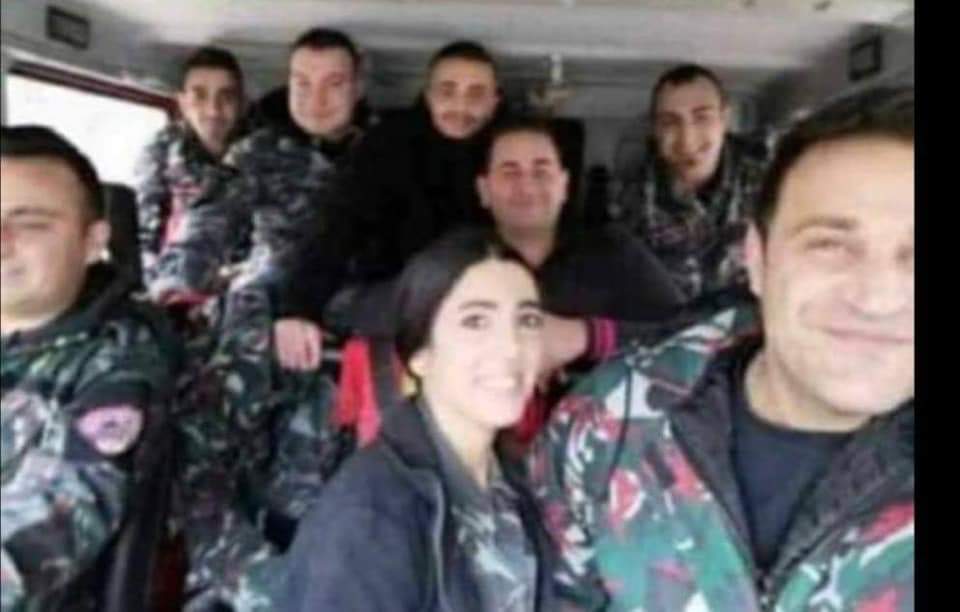
Her family is still in shock, and her mother cannot believe that a daughter getting ready to wear a wedding gown is dead.
Her colleagues described her as “passionate in doing her work, the first to run whenever she heard the fire alarm, and a dynamic rescuer.”
The team headed to the port, two minutes away, to assist the fire unit stationed there. “There are preliminary pictures taken by the team while our firefighters were trying to open the warehouse accompanied by a civilian,” said Lt. Ali Najm, PR officer for the Beirut Firefighter Brigade.
“It turned out they needed help and we sounded the fire alarm one more time. So all the firefighters were headed to the scene when a huge explosion occurred, the headquarters’ walls crumbled and great damage ensued,” he added.
“Had our firefighters been at the headquarters at the time, we would’ve endured even greater human loss.”
Kaaki’s mother said her son was doing his duty although he was not on that day’s shift. “I’m trying to calm myself saying God had given him to me and God took him away, yet I can’t bear the tragedy,” she said at her home in Burj Abi Haidar in Beirut. “My daughter-in-law is pregnant and already has a 4-year-old daughter. Is this acceptable?”
The grieving mother added: “Everyone should be hanged … especially the one who says his party has no access to the port or the airport. If you know what’s stored in Haifa, how come you don’t know what’s stored in the Port of Beirut or the rest of the country?”
After Kaaki’s body was identified through a DNA test, his colleagues and friends wrote on his pictures raised in Beirut: “Farewell O’Hero.”
“Rami had been in service in the fire brigade for 12 years now,” his brother Khairuddin said. “He was the one who called the headquarters asking for support, and had other firefighters not headed to the fire trucks on their way to the port, they would’ve definitely got hit. Rami saved his colleagues.”
Noon, 27, came from Mishmish village in Jbeil district. After the explosion, his brother William, a volunteer in the Civil Defense brigade, returned to the port every day for information.
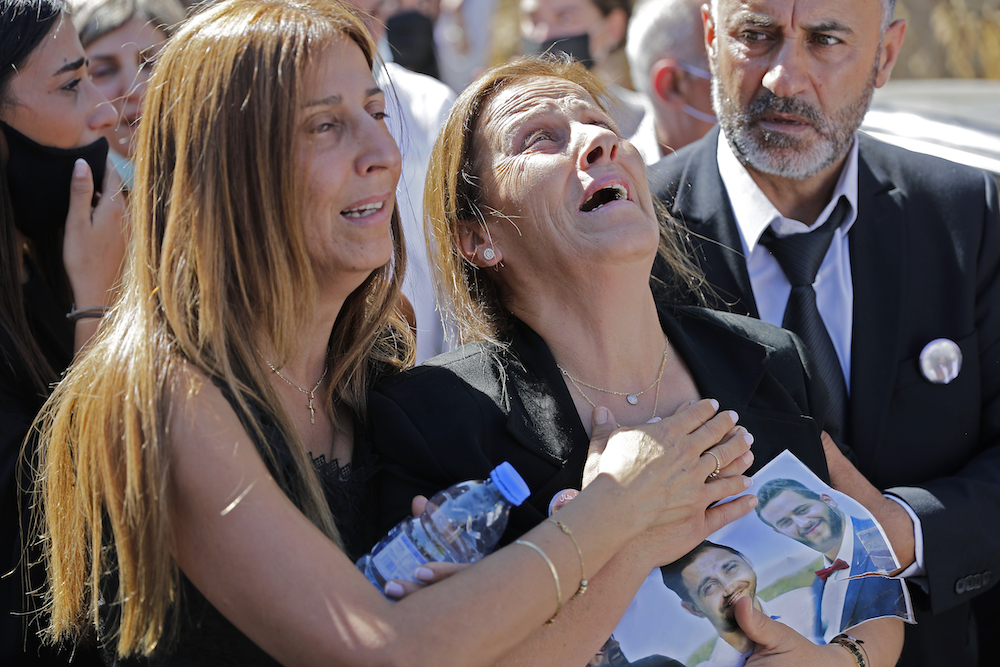
Relatives react during the funeral procession of firefighters Charbel Hitti, Najib Hitti, and Charbel Karam in their hometown of Qartaba, north of the Lebanese capital Beirut. (AFP)
The body of strong and sturdy Noon, known for once singlehandedly dragging a truck, was found under the rubble. The last picture taken of him showed him trying to open the warehouse door.
Firefighters who survived the explosion blamed port officials. “They reported a fire but didn’t report what was stored in the warehouse,” one said.
“They took our teammates to certain death. Had they known what was in warehouse No. 12, they’d never have gone in to become mangled corpses.”
------------------
Twitter: @najiahoussari





























